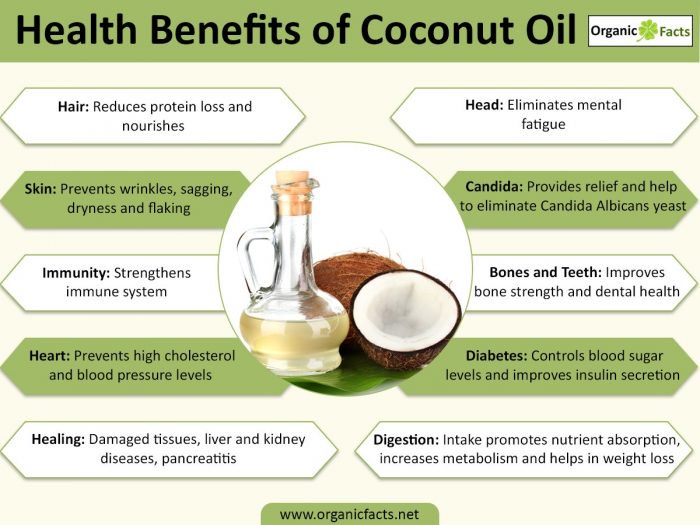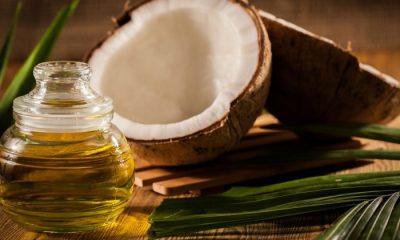Health
16 Proven Health Benefits, Uses Of Coconut Oil
Published
7 years agoon
By
Publisher
Wondering what coconut oil is good for? Well, health benefits of coconut oil include improving heart health by increasing the HDL cholesterol levels, promoting weight loss, treating yeast infections, skin care, hair care, improving digestion, and boosting immunity against a host of infections and diseases. The oil is used not just in tropical countries, where coconut plantations are abundant, but also in the U.S., Canada, Europe, and Australia. People are discovering the wonders this oil can create, and it is again gaining popularity throughout the world.
Let us look at some of the known benefits of this oil.
Health Benefits
Coconut oil has several health benefits, the most important ones being its usefulness in hair care and skin care.
Increases levels of HDL Cholesterol
According to Walter C. Willett, M.D., Harvard Medical School, coconut oil helps to increase the levels of HDL cholesterol (good cholesterol) that aid in improving heart health.
Promotes Weight Loss by Burning Fat
Coconut oil is useful for weight loss too. Unrefined, cold pressed coconut oil for hair, skin, and cooking contains short and medium-chain fatty acids that help in taking off excessive weight.
Research suggests that it helps reduce abdominal obesity in women. It is also easy to digest as compared to other edible oils and helps in healthy functioning of the thyroid and endocrine system. Further, it increases the body’s metabolic rate by removing stress on the pancreas, thereby, burning more energy and helping obese and overweight people lose weight.
Hence, people living in tropical coastal areas, who use coconut oil every day as their primary cooking oil, are normally not fat, obese or overweight. Several people focus on exercises to lose weight, from using indoor machines like leg press machines to outdoor exercises like running and playing sports. While this is a good approach to lose weight, including products like coconut oil enhances your weight loss efforts.
Improves Heart Health
The lauric acid present in coconut oil helps in actively preventing various heart problems like high cholesterol levels and high blood pressure. It does not lead to an increase in LDL cholesterol levels, and it reduces the incidence of injury and damage to arteries and therefore helps in preventing atherosclerosis.
 A study suggests that intake of this oil may help in maintaining healthy lipid profiles in pre-menopausal women. So, finally, is it good or bad for the heart?
A study suggests that intake of this oil may help in maintaining healthy lipid profiles in pre-menopausal women. So, finally, is it good or bad for the heart?
Well, if you are using it for edible purposes, check your cholesterol levels regularly. If you find them increasing, it is better to stop the intake. In any case, do consult a professional medical practitioner before you start consuming coconut oil. Never play with your (and someone else’s) heart!
Hair Care
Do you know the reason for long and shining hair of women in tropical coastal regions? Yes, it is coconut oil.
Women in tropical coastal regions of the world use this oil for their hair almost daily. This thick butter-like oil helps in a healthy growth of your hair and gives a shine to those strands. It is also highly effective in reducing protein loss, which if unchecked can lead to various unhealthy qualities in your hair. Due to low molecular weight, it is able to penetrate the hair shaft and prevent hair damage.
This is the reason why it is used as a hair care oil, and in the manufacturing of various conditioners and dandruff relief creams. The best variety for healthy hair is organic extra virgin coconut oil. Just apply it topically to your hair or use a coconut oil hair mask.
Worried about damaged hair? Again coconut oil is the solution. It is an excellent conditioner and helps the re-growth process of damaged hair. It also provides the essential proteins required for nourishing and healing damaged hair. Research studies indicate that it provides better protection to hair from damage caused by hygral fatigue.
By regularly massaging your head with it, you can ensure that your scalp is dandruff free, even if your scalp is chronically dry. It also helps in keeping your hair and scalp free from lice infestation.
Skin Care
Did you know that coconut oil works great for skin? Well according to a 2018 study on the effects of plant oils on the skin, coconut oil is found to be rich in antibacterial, anti-aging, antioxidant, wound healing, and anti-inflammatory properties.
It also helps in treating various skin problems that include the following:
Eczema & psoriasis: Topical application of virgin coconut oil reduces the severity of these conditions.
UV radiation: Coconut oil protects the skin against the harmful effects of UV rays.
Dermatitis: A study by Allison L. Goddard and Peter A. Lio suggests that coconut oil is effective in relieving symptoms of atopic dermatitis as compared to mineral oil. Another study found that virgin coconut oil can be used as an effective way of treating atopic dermatitis
Skin wound: Virgin coconut oil helps to speed up wound healing.
Xerosis or dry skin: Pure cold-pressed, organic, non-GMO coconut oil is an excellent massage oil that acts as an effective moisturizer for all types of skin, including dry skin.
Antimicrobial activity: Monolaurin is an active component of coconut oil that is found to be antibacterial, antiviral, and antifungal in nature. It protects against the harmful effects of bacteria such as Staphylococcus aureus that causes pimples and other skin infections.
Burns: Use of coconut oil helps in effectively treating burns
Other: Skin barrier repair
Unlike mineral oil, there is no chance of having any adverse side effects on the skin from the application of this oil. Therefore, it has been safely used for thousands of years for preventing dryness and flaking of skin.
For this exact reason, this oil forms the base ingredient of various body care products like soaps, lotions, and creams that are used for skin care. What more? It also delays the appearance of wrinkles and sagging of skin, which normally accompany aging.
Coconut Oil aids in Treating Alzheimer’s disease
A recent research suggests that the use of coconut oil improves the cognitive abilities of Alzheimer’s patients. MCTs found in coconut oil are a great source of ketone that is associated with improving memory. But more clinical and scientific data is needed to ascertain whether coconut oil actually boosts the functioning of the brain in any form. NIH is currently running a clinical trial to find the same.
Coconut Oil helps Prevent Yeast Infection – Candida
Candida, also known as systemic candidiasis, is a tragic disease caused by an excessive and uncontrolled growth of yeast called Candida albicans in the stomach. A study on coconut oil suggests that it provides relief from the inflammation caused by candida, both externally and internally. Its high moisture retaining capacity keeps the skin from cracking or peeling off. Capric acid, caprylic acid, caproic acid, myristic acid, and lauric acid found in coconut oil help in eliminating Candida albicans.
Further, unlike other pharmaceutical treatments for candida, the effect of coconut oil is gradual and not drastic or sudden, which gives the patient an appropriate amount of time to get used to the withdrawal symptoms or Herxheimer reactions (the name given to the symptoms accompanying body’s rejection of toxins generated during elimination of these fungi). But in the treatment of this condition, people should systematically and gradually increase their dosages of coconut oil, and shouldn’t initially start with a large quantity.
Speeds Up Healing
When applied to infected areas, coconut oil forms a chemical layer that protects the infected body part from external dust, air, fungi, bacteria, and viruses. It is highly effective on bruises because it speeds up the healing process of damaged tissues.
Coconut Oil is good for Improving Your Immunity
Coconut oil strengthens the immune system because it contains antimicrobial lipids, lauric acid, capric acid, and caprylic acid, which have antifungal, antibacterial, and antiviral properties. The human body converts lauric acid into monolaurin, which research has supported as an effective way to deal with viruses and bacteria that cause diseases like herpes, influenza, cytomegalovirus, and even HIV. Coconut oil helps in fighting harmful bacteria like Listeria monocytogenes and Helicobacter pylori, and harmful protozoa such as Giardia lamblia.
Coconut Oil Prevents IBS and other Digestive Issues
Liquid coconut oil helps improve the digestive system, and thus, prevents various stomach problems including irritable bowel syndrome (IBS). The saturated fats present in it have antimicrobial properties and help in dealing with various bacteria, fungi, and parasites that can cause indigestion. Coconut oil is effective in relieving constipation. It also helps in the absorption of other nutrients such as vitamins, minerals, and amino acids.
Coconut Oil Promotes Dental Care
Calcium is an important component of our teeth. Since coconut oil facilitates the absorption of calcium by the body, it helps in developing strong teeth. It also stops tooth decay. Recent research suggests that oil pulling using coconut oil is also beneficial in reducing plaque formation and plaque-induced gingivitis.
Benefits of Coconut Oil
Coconut Oil rich in MCTs Prevents Kidney stones & Protects Liver
The presence of medium chain triglycerides and fatty acids in coconut oil helps in preventing liver diseases. This is because those substances are easily converted into energy when they reach the liver, thus reducing its workload and also preventing accumulation of fat. It also helps in preventing kidney and gall bladder diseases and helps dissolve kidney stones. Coconut oil is also believed to be useful in keeping the pancreas healthy by treating pancreatitis.
Helps in AIDS & Cancer Treatment
It is believed that coconut oil plays an instrumental role in reducing the viral susceptibility of HIV and cancer patients. Preliminary research has shown an indication of this effect of coconut oil on reducing the viral load of HIV patients.
According to the Coconut Research Center, coconut oil kills the viruses that cause influenza, measles, hepatitis, herpes, SARS, and other serious health risks. It also kills bacteria that cause ulcers, throat infections, urinary tract infections, pneumonia, and gonorrhea. Finally, coconut oil is also effective in the elimination of fungi and yeast that cause ringworm, athlete’s foot, thrush, and diaper rash.
Other Benefits
Coconut oil is strongly recommended for a number of other benefits that are explained below. Using this oil has been shown to mildly help the following:
Stress relief: Pure coconut carrier oil for aromatherapy is very soothing and helps remove stress. Applying it to the head, followed by a gentle massage, helps eliminate mental fatigue. According to research, virgin coconut oil gives relief from stress and has antioxidant properties
Diabetes: Pure coconut oil helps in controlling blood sugar, and improves the secretion of insulin. It also promotes the effective utilization of blood glucose, thereby, preventing and treating diabetes
Bones: As mentioned earlier, coconut oil improves the ability of our body to absorb important minerals. These include calcium and magnesium, which are necessary for the development of bones. Thus, it is very useful for women who are prone to osteoporosis after middle age
Boosts Energy: Coconut oil is often used by athletes, bodybuilders and by those who are dieting. The reason behind this is that it contains fewer calories than other oils, its fat content is easily converted into energy, and it does not lead to accumulation of fat in the heart and arteries. It helps boost energy and endurance and enhances the performance of athletes.
Use as Carrier Oil: Carrier oils are those oils, which easily penetrate or absorb into the skin, facilitating seepage or absorption of other oils (such as essential oils) and herbal extracts when mixed into it. It is easily absorbed through the skin’s pores and thus is used as a carrier oil.
Furthermore, being one of the most stable oils, it doesn’t go rancid, nor does it let the other oils, herbal extracts, or medicines spoil inside of it. It does not alter the properties of the oils and herbs mixed with it. It also protects the herbs and oils from microbial or fungal interactions.
The oil is expensive in several countries; however, in tropical countries, its cost is low enough to make it affordable as a carrier oil. It is best to use pure and fractionated coconut massage oil for skincare.
Rich source of Fatty acids that provide many benefits
According to the USDA National Nutrient Database for Standard Reference, coconut oil contains 0 cholesterol and is a good source of energy, lipids, and various other nutrients. It contains vitamins and minerals such as vitamin E, vitamin K, calcium, zinc, and iron.
More than 90% of coconut oil consists of FFAs or free fatty acids, saturated fats (Don’t panic! It’s not as bad as it sounds, read until the end of this and your opinion may change), along with traces of a few unsaturated fatty acids, such as monounsaturated fatty acids and polyunsaturated fatty acids. Virgin coconut oil is no different from this.
Saturated fatty acids
Most of them are medium chain triglycerides, which are supposed to assimilate well into the body’s systems.
Lauric acid: It is the chief contributor, representing more than 40% of the total, followed by capric acid, caprylic acid, myristic acid, and palmitic acid. The human body converts lauric acid into monolaurin. Lauric acid is helpful in dealing with viruses and diseases.
Capric acid: It reacts with certain enzymes secreted by other bacteria, which subsequently converts it into a powerful antimicrobial agent, monocaprin.
Caprylic acid, caproic acid, and myristic acid: They are rich in antimicrobial and antifungal properties
Stearic acid: This acid has cleansing and solidifying properties. No wonder it is used for skin care products.
Unsaturated fatty acids
The oil contains polyunsaturated fatty acids- linoleic acid, monounsaturated fatty acids- oleic acid
Poly-phenols: Coconut contains gallic acid, which is also known as phenolic acid. These polyphenols are responsible for the fragrance and the taste of coconut oil. Virgin coconut oil is rich in these polyphenols.
Derivatives of fatty acid: It also contains betaines, ethanolamide, ethoxylates, fatty esters, fatty polysorbates, monoglycerides, and polyol esters.
Derivatives of fatty alcohols: Apart from the above mentioned fatty acids it also contains fatty chlorides, fatty alcohol sulfate, and fatty alcohol ether sulfate.
How to Use and Store: Unlike most other oils, coconut oil has a high melting point – about 24 to 25 degrees Celsius or 76-78 Fahrenheit. Therefore, it is solid at room temperature and melts only when the temperature rises considerably. It is often in this form and is not supposed to be kept it in the refrigerator.
If you are using it for topical purposes, especially hair care, just melt the oil (if it is solid) by keeping the bottle in the sun or soaking it in warm water.
You can also take some oil out and put it in a small bowl and warm it. Then, take the oil on your palm and apply it to your hair.
You can use coconut oil for cooking your favorite recipes. It can easily replace butter or vegetable oil.
Remember, you don’t need to completely switch to the oil because then you will lose other benefits from more traditional oils and dairy products.
In colder countries, the oil comes in good, broad containers. However, if you get it in a pack (tetra-pack or plastic pouch), after opening the pack, be sure to keep the oil in containers with a tight lid and broad mouth. This will help you scoop it out with a spoon if it solidifies. Make sure you seal the container well to avoid any attention of insects or rodents!
I don’t like the taste of coconut oil. What should I do?
If you are keen on trying it then may be using it in a variety of recipes, and using it in baking may help. In case if you feel nauseated then don’t force yourself to eat it. Just in case you develop allergic reactions then it is better to avoid coconut oil completely.
The oil is available in various forms. You can try neutral tasting, steam refined coconut oil as it does not have a distinct taste and flavor. Coconut oil capsules are also available in the market.
- Culled from www.organifacts.net
You may like
Trending

 Health6 days ago
Health6 days agoDeclassified CIA memo explored concealing mind-control drugs in vaccines

 Entertainment1 week ago
Entertainment1 week agoSimi addresses resurfaced 2012 tweets amid online backlash

 Crime6 days ago
Crime6 days agoSenior police officers faces retirement after Disu’s appointment as acting IGP

 Education1 week ago
Education1 week agoPeter Obi urges JAMB to address registration challenges ahead of exams

 Health1 week ago
Health1 week agoNAFDAC issues alert on suspected revalidated SMA Gold infant formula

 Comments and Issues7 days ago
Comments and Issues7 days ago20 Critical Fixes to Save Nigeria’s Democracy from Electoral Fraud

 Latest7 days ago
Latest7 days agoICPC yet to respond to El-Rufai’s bail request as arraignment date looms

 Football1 week ago
Football1 week agoMartínez ruled out of Everton clash with calf injury








